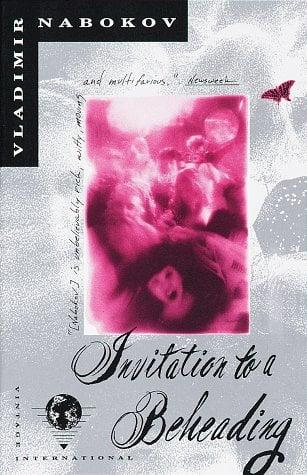
Invitation to a Beheading
Book Description
Caged in a surreal prison of absurdity and despair, Cincinnatus C. awaits his execution in a world where reality is grotesque and illusion reigns. As he navigates the labyrinth of his mind and the bizarre behaviors of those around him, he grapples with identity, love, and the impending doom of his fate. The tension builds as the walls close in, revealing a chilling critique of power and conformity. With each passing moment, the line between sanity and madness blurs. Will Cincinnatus find liberation through acceptance, or will he succumb to the absurdity of his existence?
Quick Book Summary
"Invitation to a Beheading" by Vladimir Nabokov is a surreal, dystopian novel that follows Cincinnatus C., an enigmatic man imprisoned and sentenced to death for the incomprehensible crime of "gnostical turpitude." Trapped in an absurd world where those around him appear as hollow caricatures, Cincinnatus struggles to maintain a sense of self against the pervasive artificiality and imposed conformity of society. As his execution nears, he reflects on his past, clings to the hope of escape, and dreams of genuine human connection. Nabokov crafts a haunting exploration of alienation, the arbitrary power of the state, and the resilience of the self. The novel uses vivid imagery and dark humor to explore themes of identity, resistance, and the blurred boundaries between reality and illusion.
Summary of Key Ideas
Table of Contents
Alienation and Individuality
Cincinnatus C., the protagonist, finds himself condemned to death for the ambiguous crime of "gnostical turpitude"—a transgression that highlights his fundamental difference from the society around him. His jailers and visitors embody a shallow, almost puppet-like normalcy, reinforcing Cincinnatus's alienation. In the claustrophobic environment of the prison, Cincinnatus copes with the surreal routines and circular conversations imposed by his captors. The grotesque, dreamlike world mirrors his internal struggle to maintain a sense of reality and purpose in the face of existential uncertainty.
Absurdity of Authority and Power
The authorities in the novel, particularly the director Rodrig Ivanovich and the jailer Rodion, display a chilling banality and absurdity. Their arbitrary enforcement of rules and rituals exposes the dangers of unchecked power and the loss of individual rights. The looming execution is treated as a spectacle, and bureaucracy takes precedence over any sense of justice. Through this, Nabokov critiques authoritarianism and the dehumanizing effects of conformity, showing how those in power use absurdity to maintain control and suppress dissent.
Reality vs. Illusion
Cincinnatus's subjective experience blurs the distinction between reality and illusion. The narrative style, rife with surreal imagery and fluid time, mirrors his disorientation and longing for something authentic. Characters often behave as if on a stage, with the prison itself shifting in improbable ways. This instability erodes any confidence in what is real, reflecting Cincinnatus’s feeling of living in a world devoid of genuine meaning, where only the individual’s inner life maintains substance and coherence.
Search for Meaning and Liberation
Despite the dire circumstances, Cincinnatus searches desperately for understanding and true connection, particularly with his wife Marthe and a mysterious fellow prisoner, M'sieur Pierre. His longing for communication and recognition underscores the human need for meaning beyond imposed identities and roles. In the novel’s final moments, as the execution proceeds and the fabric of the artificial world seems to unravel, Cincinnatus achieves a profound sense of liberation by accepting his difference and asserting his existence against absurdity.
"Invitation to a Beheading" ultimately stands as a powerful meditation on the resilience of the self in the face of societal madness. Nabokov weaves philosophical depth, dark humor, and linguistic inventiveness into a narrative that resonates as both a political allegory and a personal odyssey. The novel invites readers to question the nature of reality, the cost of conformity, and the possibility of freedom through self-knowledge, even when the world itself appears to be conspiring against authenticity.
Download This Summary
Get a free PDF of this summary instantly — no email required.





